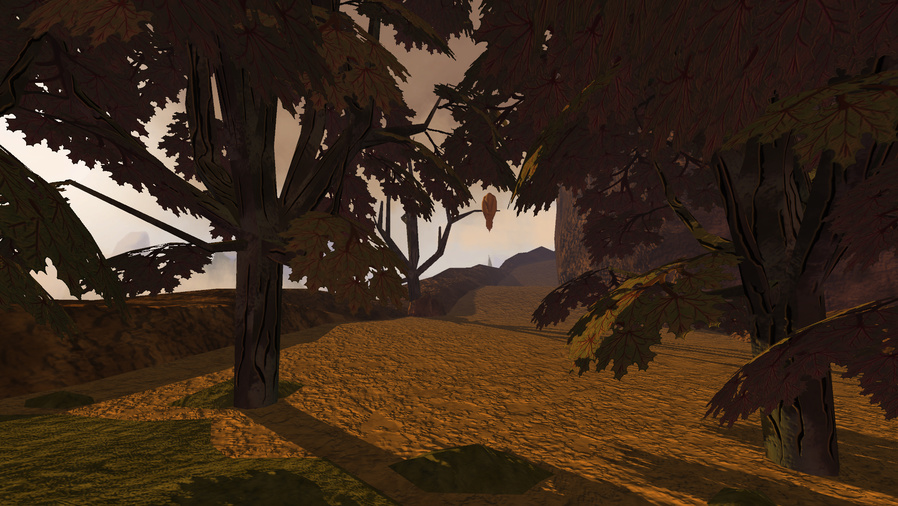Each compact scene in Mikkel Brøns-Frandsen’s “interactive poem” Look encourages in me an abnormal response. I’m not a poet, and don’t strive to be, but its orchestration of the wilds and of nature, its beauty and savageness, gives me a poet’s confidence around lyrics and rhythms.
Just thinking about it impregnates me with an unexpected sonnet. How I stood amid a gentle cascade of falling golden leaves, skimmed across a sunlit cliffside admiring the laboring wings of a majestic predatory bird, and crept between the meat-stripped ribcages of a mighty brown bear’s frightening lair. It’s a short journey through nature with a joyful revelation at its end that had me beaming with a grin that couldn’t be held back (not that I was trying to restrain it).
Playing through it has brought me to find broader clarity on the purpose and aim of “game poems”, which is to reverse the efforts of traditional poems. John Clare and William Wordsworth use the written word to spin romantic images in our minds, evoking feelings and memories with playful verse. Whereas game poems are able to drop us right inside the dioramic spaces that poets metaphysically transport us to, giving us the ability to feel out their 3D-ness, and let all the important smaller details in through our digitized senses. In short, they flip the tables by inspiring us to transform our observations and emotions into words.
This is what the game poem Morning Coffee does as it fades us into a familiar setting using visual cues and comforting sounds. You sip on a steaming cup of coffee, comforted by the steady sound of rainfall, and then pick up your jingling keys from a nearby kitchen surface. And then it zooms out from this tightly focused scene to connect our daily rituals to a vaster acknowledgement of the universe and our place within it.
Look has the same structure as Morning Coffee, but it feels tighter and more confident due to it being split between multiple scenes, each with a determined pathway, and a start and an end. These scenes act as stanzas do in traditional poems, connected by their rhymes, but divided by their breaks. Each one has its own pace, color scheme, and purpose. As you move through them, it’s as if you’re an accidental conductor, with the environment and its creatures reacting to your presence precisely on time, all slotting into the frame of a meaningful snapshot.

Importantly, the composition is bare enough so that each element is given its deserved attention, all of it bold and impacting. The powerful gusts of snow-white wind that push us around inform us of the harsh environment. The distant growl of the bear in the evil green cave tells us to be weary. The leaves have a skeletal detail, tree trunks are cracking with age, and the mud is blotchy like actual sludge; the textures bring a sensual portrayal of nature through their tactility. This is the lingual richness of a poet brought to life as an interactive experience.
Game poems, or “interactive poems”, cut out the more portentous aspirations of videogames in order to find rhythm and metaphor in every small moment of our interactive experiences. Some may see that as being considerably loftier than larger videogames. But it’s a delineated discipline, an exercise that requires restraint and confidence to pull off; to bring sound, space, and interaction together as an affecting poetic composition. Not a single misstep can be afforded, just as a written poem consists of the minimum necessary words to paint us a vivid picture.
You can download Look for free on Game Jolt.
